The Chron has a feature up that superimposes the size and shape of Beltway 8 — which defines a meaningful subset of, but not all of, the Houston metro area — over other cities.
Check it out.

The Chron has a feature up that superimposes the size and shape of Beltway 8 — which defines a meaningful subset of, but not all of, the Houston metro area — over other cities.
Check it out.
Seriously, read this.
Without network neutrality, Tumblr could cut a deal with your ISP — let’s say it’s Comcast — and its blogs would load really quickly while that home server blog might take minutes to load pictures. It might not even load at all. You can see why people in the freedom-of-speech obsessed United States might not be happy with chucking network neutrality. It privileges some speech over others, based on financial resources.
And more:
This is the first step toward a world where corporate monopolies on content start affecting not just what you can see and read online — but also how you gain access to it. The signal will be out there, but your ISP just won’t deliver it to you.
An internet without network neutrality will look a lot like television does now. You’ll depend entirely on your cable company to get broadcasts, and they will only deliver their handpicked channels in their cable packages. There will probably be a little room for the web equivalent of public access television, but it will be so underfunded and slow to load that almost nobody will see it.
It used to be that when a show couldn’t make it on broadcast television, we would watch it online. That’s how amazing stuff like Dr. Horrible made it into the world. But without net neutrality, we lose that option too. If a company doesn’t have the money or legal acumen to get its content included in ISP packages, you will never see its programming. You’ll never have those shows; you’ll never have those apps; and you’ll never know what you’re missing.
Call your congresspeople. Make noise. This is a big deal.
The milquetoast, lapdog FCC has decided against network neutrality, and we’re all going to suffer for it. Read Tim Wu’s excellent analysis for more, but do NOT overlook that the person doing a big chunk of the fucking us right now lives at 1600 Pennsylvania; Obama campaigned on neutrality, and has completely failed to deliver.
From Wu’s piece in the New Yorker:
In 2007, at a public forum at Coe College, in Iowa, Presidential candidate Barack Obama was asked about net neutrality. Specifically, “Would you make it a priority in your first year of office to reinstate net neutrality as the law of the land? And would you pledge to only appoint F.C.C. commissioners that support open Internet principles like net neutrality?”
“The answer is yes,” Obama replied. “I am a strong supporter of net neutrality.” Explaining, he said, “What you’ve been seeing is some lobbying that says that the servers and the various portals through which you’re getting information over the Internet should be able to be gatekeepers and to charge different rates to different Web sites…. And that I think destroys one of the best things about the Internet—which is that there is this incredible equality there.”
If reports in the Wall Street Journal are correct, Obama’s chairman of the Federal Communications Commission, Thomas Wheeler, has proposed a new rule that is an explicit and blatant violation of this promise. In fact, it permits and encourages exactly what Obama warned against: broadband carriers acting as gatekeepers and charging Web sites a payola payment to reach customers through a “fast lane.”
Also, don’t get taken in by the language being used. As Marco points out, the whole discussion of “fast lanes” frames the issue incorrectly. They’re not going to build anything new, and haven’t for years (US customers pay more for broadband, and get lower speeds, than virtually anywhere else in the industrialized world). Your connection isn’t going to get better. This is all about carriers being able to charge providers again for traffic that’s already been paid for — and you can bet your ass it’ll also eventually include blocking or slowing traffic that competes with offerings of their own. This is why we hear so much about NetFlix in these conversations: it’s a direct competitor to Comcast and AT&T and Verizon, all of which would prefer you continue to pay through the nose for traditional cable packages and avoid these newfangled “Internet shows.”
This is what happens, too, in a political environment where any regulation is treated as creeping socialism by the know-nothing right. The noise chamber effect prevents just and proper things from taking hold.
Instead of working with firms like Lyft and Uber to complement the existing transit infrastructure, some cities — including Houston, goddammit — are running sting operations designed to fine and punish them, much to the general pleasure of incumbent suck-ass operators like YellowCab.
This covers it, don’t you think?

(Brilliant original work by this artist, found over on Wheaton’s Tumblr.)
Turns out, if you’re a US citizen, and you get murdered in a drone strike, the courts will not give your surviving family any relief.
So much for checks and balances.
I supposed it’s at least nominally good news that another judge has insisted that the Administration actually disclose the legal doctrine they’re using to justify this behavior, which up to now had been “classified,” which is a position best described as Orwellian.
The TurboTax maker has actively lobbied to keep tax rules from getting any simpler.
…the US isn’t much of a democracy anymore, at least not by the metrics that matter, according to a new study.
“[T]he preferences of economic elites,” conclude Princeton’s Martin Gilens and Northwestern’s Benjamin I. Page, who work with the nonprofit Scholars Strategy Network, “have far more independent impact upon policy change than the preferences of average citizens do.”
So, yay?
A three-word phrase that should trouble you: Accidentally Turing-Complete.
The House of Representatives Committee on Science is Turning Into A National Embarrassment.
Leading the charge was Texas congressman Randy Weber:
Several members, for example, appeared to be trying to mock rather than engage Holdren on climate change. “I may want to get your cellphone number, Dr. Holdren,” said Representative Randy Weber (R–TX), “because, if we go through another few cycles of global warming and cooling, I may need to ask you when I should buy my long coat on sale.”
Weber, a freshman from the Galveston area, began his interrogation by asking Holdren whether “when you guys do your research, you start with a scientific postulate or theory and work forward from that? Is that right?” Holdren gamely played along, explaining that “it depends on the type of science, but the notion of posing a hypothesis and then trying to determine whether it is right is one of the tried and true approaches in science, yes.”
But Weber’s question was really just a setup for his concluding statement. “I just don’t know how you all prove those theories going back 50 or 100,000 or even millions of years,” Weber said.
NYPD Twitter: “Hey, everybody! Post pictures of yourself with NYPD! Use #myNYPD!”
Everybody (smiling): “You got it!.”
And so:
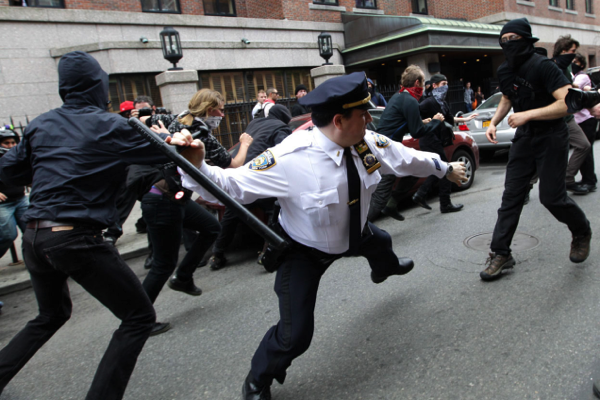
To be fair, unconstitutional, immoral, and outright bigoted eruptions of violence are a core part of the NYPD brand.
A Reuben’s tube is an apparatus used to demonstrate standing waves in physics; it’s akin to the gas lighter in your fireplace, but with sound added. At certain frequencies, the flames will vary according to the standing wave produced in the tube.
Things get exponentially more awesome if you make a 2-D tube, and apply more interesting music. At the link, the vid is cued to the music, but it’s really worth watching the whole thing.
As you do.
(No, seriously, this is amazing.)
No, seriously.
Several states with GOP governors who refused the Medicaid expansion have passed bills requiring legislative approval for any decision reversing that refusal.
Happy Easter.
Exhibit A: GoPro footage from a teammate edited down to 2:38; look for me at about 1:05, as we roll into Austin in a giant group.
“We ride bikes. We drink beer.”
So a dude peed in a reservoir in Portland, and in response they’re going to drain 38 million gallons of water and refill it.
It’s an outdoor reservoir. There are obviously purification steps between it and the taps of the good people of Portlandia. How much bird shit do you think goes in it on any given day?
(Via Schneier, whom you oughta be reading every day anyway.)
Corporations are becoming increasingly aggressive about forcing anyone dealing with them in even the slightest way to agree, even accidentally, to binding arbitration in the event of a dispute instead of the court system. This is because arbitration almost always finds in favor of corporations, naturally.
Apparently, you can now get trapped in such a clause by simply “liking” something on Facebook.
Glad you asked! I had a little adventure, as I think you are aware.
We started bright and early on Saturday morning, though a little less bright and a little less early than we intended. It worked out for the best, at least for me, in that I ended up riding alone with a faster teammate (who’d also been running late) until we got to Belleville, about 45-50 miles into the 100 mile first day (link’s to the Garmin site, and contains basically all the data captured on the ride). Riding with Adrian made me faster, partly because riding with someone is just better, and partly because I could draft him (thanks, man).
Consequently, I covered the first 40 miles at a generally unheard-of for me average speed of 17 MPH. That’s not fast by serious bike standards, but it’s absolutely a personal best for me. (It would be unsporting not to note the tailwind, of course.)
Adrian and I parted ways in Belleville, as I said; he took the official lunch stop, which remains criminally awful, apparently — you get a sandwich fit for a 3rd grader and crappy pasta salad with several thousand of your closest friends. It’s no wonder many of the bigger, richer teams opt for a private lunch stop. I took a page out of their books, though, and staged refreshments with my dear pals the Acostas, who also provided lunch and a special cheering section at the edge of their Belleville ranch:
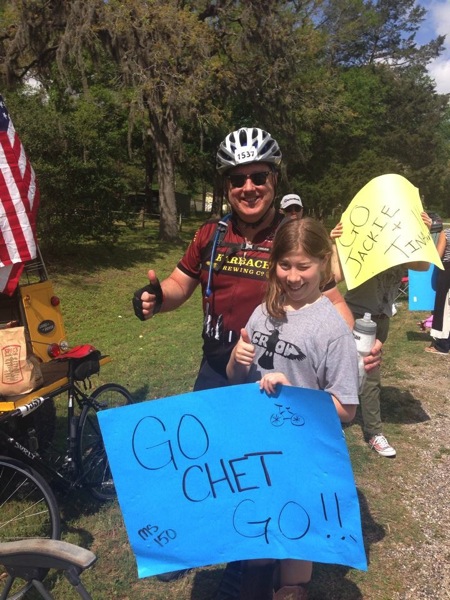
That beat the pants off the circus that was “official” lunch. I paused there for 15 or 20 minutes before riding on, refreshed and at least somewhat rested and theoretically ready to tackle the hardest miles of the ride, in my opinion: Belleville to Fayetteville. If you click through to the Garmin site on the link above, the first graph below the map is my speed plotted over a Y-axis of either time or distance. You can easily see both the wreck-mandated stop about 15 miles into the ride, and the sudden yo-yo of my velocity as I hit the hills at about mile 44; sadly, I never sustained that kind of speed again on either day, but that’s what crosswinds and hills will do for you.
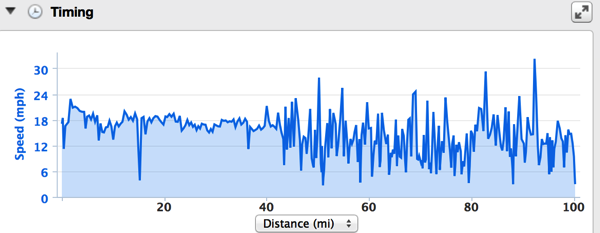
(The graph never hits zero because the Garmin autopauses if you stop; however, the deep dips at mile 51 and mile 58 are (a) me stopping to call Edgar and verify his location and (b) the actual lunch stop; other, later deep dips are also rest stops.)
To be fair, the real killer for my speed after lunch was the rolling hills. As Garmin link shows, you end up doing about 3,000 vertical feet of climbing on the day one route, which isn’t exactly trivial, and doesn’t get erased by the fact that you’re basically climbing the same few hundred feet over and over (the actual elevation difference between Houston and La Grange is only about 300 feet).
The best I can say about the rest of the ride is that it wasn’t always windy and hilly. But when it wasn’t windy, it was hilly; and when it wasn’t hilly, it was windy. And the worst winds, sadly, came on the final stretch down 2145 to La Grange’s Jefferson Street, when we turned more or less INTO the wind down a stretch of road with very little protection. That you’re almost done (maybe 7 to go?) at that point doesn’t help much when the wind hits you.
Around this point I realized that the course was slightly short, at least according to the Garmin. If you zoom into the map closely, you can see how I handled it. Once I realized I was only going to log 99.2 miles, I turned around and backtracked for 0.4 miles before heading in. Think about it: would YOU spend 7 hours in the saddle and NOT have your GPS say you rode the full century?
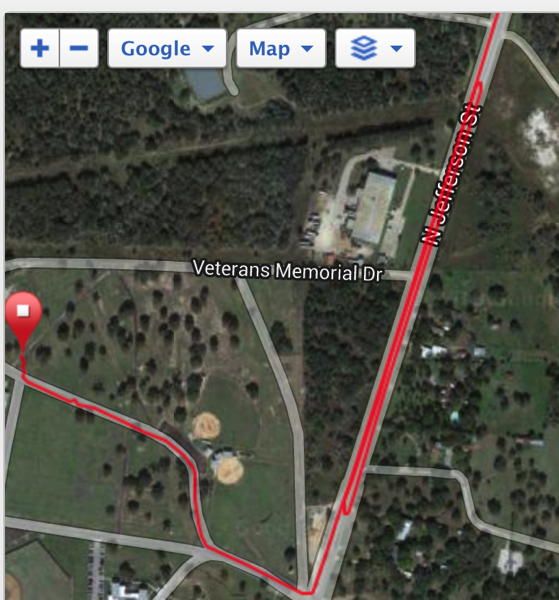
The other fun thing is something Strava calculates for you. Strava, if you don’t know, is sort of a cycling Facebook that’s gaining steam largely because of the way that make it simple to compare your performance to other cyclists. One of their metrics is the Suffer Score. I knew I was miserable towards the end, and it appears I now have the metrics to prove it!
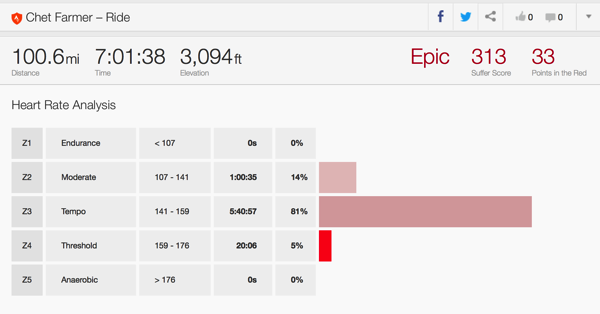
“Epic suffer score, Brah!”
I’m pretty sure that graphic is also the punchline for day two, because I didn’t (and couldn’t) hit it nearly as hard. I felt pretty low energy, and the storm clouds brewing certainly weren’t helping my mood. I couldn’t seem to make my legs work as hard as they had on Saturday (hello, fatigue — unsurprisingly this shows up in the stats as persistently lower heart rate).
Even though day two is much shorter — “only” about 68 miles — this time around I had real trouble, and I think it was both pushing so much harder on Saturday, and then not getting fueled enough early enough on Sunday.
Fortunately, I got to address both of those after lunch. The team started trying to ride together starting at the next-to-last stop — we actually rolled out of that one in a pace line 15 or more riders long, much to the chagrin of some uptight folks on other teams — and got serious about it in the last 10-12 miles.
Here’s the line; I’m not in this shot, which means I was either further up or further back, but it gives you an idea how it was going at that point:

This process took effort, because even with the fastest guys holding back, and middle-of-the-pack guys like me, it took time for the slowest folks to catch up with us. We took long breaks at the final rest stop, and then at two different appointed “rallying points” before we rolled into Austin proper — and then held up again, super close to the finish, to make sure three more could join who’d been delayed by a flat.
The result of all this was super worth it, though. For one thing, I’d recovered enough that I could ride the hills hard in downtown Austin, and for another it meant that about sixty of us crossed the finish line in a giant blur of red and blue, and let me tell you how awesome that felt!
I will say, though, again and for the record, Austin needs to just give the fuck up on the pylon thing. They’ve tried both years to sequester the cyclists into a single lane (potentially workable, on a smaller event) or even into the bike lane (absolutely impossible). There are 15,000 bikers riding into Austin on the Sunday of the 150, and we travel in packs. It’s unsafe to try to compress them too much in the last stretch, and downright absurd to put actively hazardous items in their way. The cones get hit and shoved all over the place, and you can’t see them until the last second when you’re riding in a pack.
Both years I’ve ridden outside the pylons for a good chunk of the Austin course because it’s SAFER to be where it’s less crowded. Seriously, Austin, get a clue.
Energy is key. I’m still not so great about eating enough on distance rides, and that hurt me later in the day on Saturday, and for much of the day on Sunday.
The Garmin LiveTrack is awesome — I’m shocked at how well it worked — but it needs juice, too. Even though it was only trickling data up to the web, the phone gave up the ghost about 75 miles in on Saturday, which certain people found alarming. I rode with a backup battery on Sunday, so the LiveTrack stayed up.
I gotta stay on the training treadmill all year. I’d have had much faster rides both days if I were stronger, and I’d be stronger (and lighter) if I hadn’t taken like 5 months off from riding entirely. Oops.
Being loudest has its advantages; this is my team winning best jersey, awarded based on fan noise (video to follow):

Oh, indeed. Karbach uber alles!
At TPM: “Tea Partiers Livid State GOP Wants Clarification On White Supremacy Affiliation.”
There is so much derp in this bit:
[State Senator Chris] McDaniel had been slated to be the keynote speaker at a combined Firearm Freedom Day/ Tea Party Music Festival in Guntown, Mississippi. That event featured a vendor who sold Confederate memorabilia and founded the Council of White Patriot Voters and the Confederate Patriot Voters United, which the Southern Poverty Law Center listed as an active white nationalist group.
In a story full of amazement, I was even MORE amazed to discover that there is a place called Guntown, MS. Because OF COURSE THERE IS.
If they did, as has been pointed out, they would’ve reported the Heartbleed bug instead of ruthlessly exploiting it.
So the net was aflame over Mozilla naming known homophobe Eich to CEO, and he was (rightly) out of the job just as quickly.
Having Condi Rice on the board of Dropbox is insanely worse. She’s objectively pro-torture, and represents the administration that put the NSA programs in motion — and now she has a position of authority at a company that holds users’ potentially private data?
Fuck a BUNCH of that. Might be time to DropDropbox.
Winter is coming; the night is dark and full of terrors; all men must die; and there are singing goats.
Oh, there’s more over there at Splitsider.
Olbermann on Letterman. Watch:
One of the key arguments being made by Hobby Lobby in their contraception coverage case is that some of the birth control methods being covered are “abortifacients.”
What they mean by this is that they believe they cause abortions, and reject the scientific information on offer that establishes conclusively that these drugs instead prevent conception.
This is a dangerous place to be: we have let science education get so mired in political, right-wing, evangelical bullshit combined with a populace that’s effectively illiterate that these fools are on the verge of winning a landmark case about health care on the back of their claim that their BELIEF that these drugs cause abortions, despite all medical evidence.
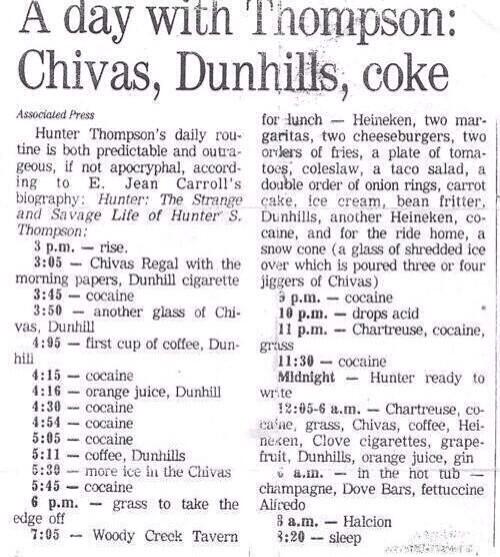
Really, just go watch the whole thing.
…on institutionalizing bigotry, anyway.
Presumably embarrassed so many other states got there first, the ruling halfwit class passed a “religious freedom” bill basically designed to give legal cover to discrimination against gays and lesbians.
I have been in this meeting a thousand thousand times.
In fact, it was a meeting like this one that prompted the conversation that birthed the NoGators.com domain name.
Late Night with David Letterman, October 6, 1983.
You’ll know the song, but as of this moment it hasn’t get been named “So. Central Rain”.
I’m pretty sure I remember watching this the next day, after school, from a VHS videotape. I was 13 years old. Letterman was 36, or 8 years younger than I am now.
Today, April 3, 2014, David Letterman has announced he’ll be retiring next year; he’ll turn 68 that year, which seems impossible, but there it is. He started with a morning show in 1980, which approximately nobody watched except me — I remember faking sick to go home and do so, so bored was I with the 5th grade.
Late Night came in 1982; the clip above is from a show still finding its feet in a timeslot when most decent folks were asleep, and in a world where recording television was still novel, and yet somehow it became the model for a new kind of late night show.
He left NBC, famously, after he was passed over for the Tonight Show in 1992, and began his current run at CBS the next year. His retirement plan suggests he’ll mark 22 years at CBS before packing it in.
The SCOTUS has struck down aggregate contribution limits in a decision that’s being called Citizens United v2.
More money means more speech for the rich, and less for everyone else.
You’re a long way from high school civics, I know, but I’m sure you know how the US Congress works: one chamber apportions representation based on population (with the will of the people widely thwarted by gerrymandering) while the other gives each state equal representation.
The US population has been migrating to urban centers for years, which concentrates progressive votes in small geographic areas — and in fewer states. The way Congress works, though, means that the GOP could gain control of the Senate while representing a minority of the US population.
And it’s likely they will.
It’s very sad that this Malaysian airplane has apparently crashed, killing all aboard and forcing CNN to go 24×7 on nearly information-free coverage. And it’s absolutely tragic that these people lost their lives. But every aviation event is not a reason to impose new security measures, especially when we don’t yet know exactly what happened.
Note the final graf in the linked story:
IATA said more than 3 billion people flew safely on 36.4 million flights last year. There were 81 accidents, 16 which were fatal with 210 deaths.
Air travel is mind-bogglingly safe. Sometimes, freak events will happen. Sometimes, crashes happen that don’t point out a need for an improved screw, or additional passenger hassle while boarding. It may very well be that this is one of those times. The fact that a couple guys on board had fake passports isn’t even particularly alarming to me; I assume some number of people fly on fake passports every day.
Remember, too, our ID fetish for air travel isn’t a safety measure — every 9/11 hijacker had valid, legal ID. It’s actually a handout to the airlines; before 9/11, tickets were effectively transferrable, which made it harder for airlines to fuck you over change fees.